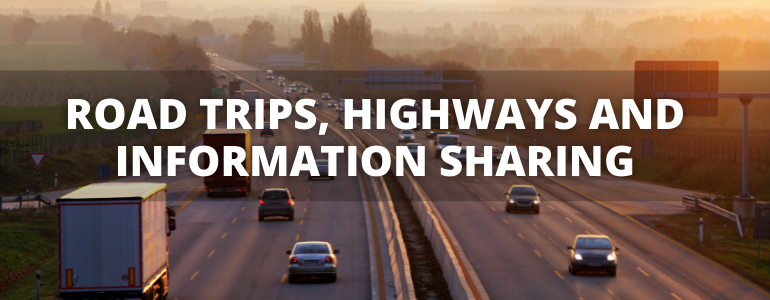
Road Trips, Highways and Information Sharing
When you ask officers why they chose to work in law enforcement, you will likely get a variety of answers. You might hear, “I wanted a career that would help people and serve my community” from some, while others declare “I knew an officer personally and looked up to them”. But how often does someone tell you that they wanted to work in law enforcement because of the daily interactions with data? Pretty much never.
And still - data (information sharing) is a part of all officers’ daily duties. When you pull someone over on the road for speeding, you will rely on data to determine what is safe to do next. In a murder investigation, finding out who is the owner of the gun found at the scene can make all the difference in the world. Whether it is something you have thought about often or not, information sharing plays a critical role in keeping you safe and helping you solve crimes.
In a sense, data is like vehicles driving on the highway and the various agencies are like their destinations. It is critical that vehicles can travel on the highway from their origin to their destination, carrying their cargo where it needs to go. While the highway itself is not the most glamorous part of the road trip, without it being open and flowing freely, the vehicles could not reach where they need to go.
Today, we would like to share with you some information about what could be considered the information superhighway of the criminal justice community; Nlets, the International Public Safety & Justice Network.
What Exactly IS Nlets?
Nlets is a 501c(3), self-funded computer-based message switching system that links together and supports every state, local, and federal law enforcement, justice, and public safety agency for the purposes of sharing and exchanging critical information. Like highways supporting the cars where they need to go, we play an important role in keeping the law enforcement community safe. However, just like the highways are different from the cars they transport, so are we from criminal justice data itself.
Simply put, we do not own any of the data that is being used in the criminal justice or public safety realm – we exist solely for the purpose of securely accessing that information for you. And believe it or not, there are probably more resources available to you than you know about.
As a police officer, it is your responsibility to be aware of what resources are available to you. Do not rely on your dispatch or someone else to tell you what you have access to. Instead, be informed and be prepared to ask your dispatch for the information you know is available to assist you with your cases.
Still Unclear About How Nlets Works?
Here is a common scenario where Nlets is used numerous times each day.
Imagine that you are a California driver on your way to Arizona. Since the drive is long and boring, you start to speed and are then pulled over by a state trooper. Because you are from California, you present your California driver license to the trooper. However, the trooper and dispatch in Arizona do not have direct access to the DMV information that California has about you, so they run a Nlets check to securely access that information.
To accomplish this, the request is sent to dispatch by way of a Nlets query. Nlets first receives the query from the agency and checks to make sure it is a valid request. This is done by validating the Originating Agency Identifier (the identification for each agency/terminal that accesses Nlets and NCIC) to make sure the agency that is requesting the information is authorized to receive it. Once the validation is complete, the request is forwarded to California. California receives the request and pulls the information that is needed by the out-of-state trooper and sends an automated response back to Nlets. Nlets receives the response from California and then forwards the information back to the dispatcher in Arizona that made the initial request and ultimately the information gets back to the trooper that pulled you over.
While this might sound like a lot of steps, the process is extremely quick, averaging about 1.5 seconds in total. What’s more, this happens all day, every day. In fact, in 2019, Nlets processed over three billion transactions.
Why Does This All Matter?
When you can take advantage of all the data you have available, it allows you to make educated decisions. And when your decision is made based on the most complete picture, it makes you better equipped to take on anything that comes your way.
At the end of the day, our goal is not to make your everyday life data-centric, but rather, to allow you to live every day in a data powered way.

